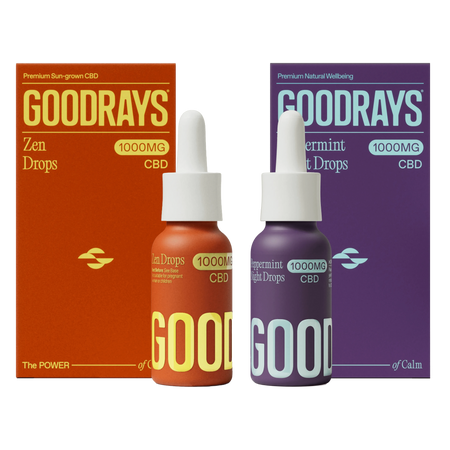A natural way to support your changing body
Let's be honest: menopause still doesn't get the airtime it deserves.
Despite being a completely natural part of life, it's too often treated as taboo. And that lack of conversation leaves many women unsure of what to expect – and unsure of where to turn when symptoms appear.
Between hot flushes, anxiety, sleep disruption, low mood and a general sense that you're not quite yourself, the menopause transition can feel overwhelming. While hormone replacement therapy (HRT) is widely prescribed, it's not for everyone – and it's no surprise that many are exploring gentler, more natural options to manage their symptoms.
One remedy that's attracting growing attention? CBD.
What are the first signs of menopause?
Menopause marks the end of your menstrual cycles, typically defined as 12 consecutive months without a period. It usually occurs between the ages of 45 and 55, though it can start earlier or later. The transition leading up to this point is known as perimenopause, and that's when most symptoms begin.
Common menopause symptoms include:
-
Hot flushes and night sweats
-
Sleep disturbances
-
Mood swings, anxiety or low mood
-
Brain fog or poor concentration
-
Vaginal dryness or discomfort
-
Lower libido
-
Joint pain or stiffness
-
Fatigue
These symptoms are largely triggered by the drop in oestrogen and progesterone, hormones that regulate everything from body temperature to serotonin levels. While HRT remains the most common treatment, some people are unable or unwilling to take it due to medical risks or personal preference. That's led to a growing interest in natural solutions, including lifestyle changes, herbal remedies – and CBD.

How does CBD work?
CBD (cannabidiol) is a non-intoxicating compound found in hemp, a variety of the Cannabis sativa plant. Unlike THC, CBD won't get you “high”, but it does interact with important systems in the body, including the endocannabinoid system (ECS).
The ECS plays a key role in maintaining balance, or homeostasis, across multiple bodily systems. It helps regulate mood and emotional responses, sleep cycles, pain perception, immune function and hormonal activity. CBD is believed to support the ECS by influencing certain receptors and helping the body better regulate stress, pain, and inflammation – areas that are often disrupted during menopause.
Can CBD help with mood changes during menopause?
As oestrogen declines, it disrupts the production of serotonin, the so-called “happy hormone” that plays a key role in mood regulation. It's one reason why anxiety and mood swings are so common during perimenopause and menopause. CBD has been shown in several studies to interact with serotonin receptors, particularly the 5-HT1A receptor, which is known to regulate anxiety and emotional balance.
For those struggling with stress, irritability or emotional ups and downs, CBD may offer a gentle, natural way to support mental wellbeing, without the sedating effects of some medications.
CBD and sleep during menopause
Insomnia is one of the most reported menopause symptoms. Night sweats, restless thoughts and anxiety can all make it hard to get restorative sleep. While research is ongoing, several studies suggest that CBD may help improve sleep indirectly by reducing anxiety, calming the nervous system and supporting more stable circadian rhythms.
In a 2019 study, 66.7% of participants reported better sleep within the first month of taking CBD. That's promising news for anyone stuck in a cycle of disrupted nights and sluggish days.
Want help winding down at night? CBD Night Drops are designed to relax the body and prepare the mind for deeper, more restful sleep.
CBD for aches, pains and joint stiffness
While hot flushes get most of the attention, many people experience joint pain, headaches and body stiffness during menopause. These symptoms may be linked to inflammation and hormonal shifts that affect connective tissue and pain perception.
CBD is widely recognised for its anti-inflammatory properties and is used by many to help manage discomfort. It's not a replacement for pain medication, but it may offer everyday support for mobility and recovery, particularly when paired with light movement, stretching or yoga.
If you're noticing new or unexplained aches, a regular dose of CBD may help ease tension and support more active, comfortable days.
Can CBD support bone health?
Oestrogen helps protect bone density, so when levels fall during menopause, the risk of osteoporosis increases. Some early-stage animal studies have found that CBD may support bone healing and growth, though more human data is needed before drawing firm conclusions.
Still, anything that helps reduce chronic inflammation and support hormonal balance could play a protective role, making CBD a supplement worth exploring.
How to take CBD during menopause
The beauty of CBD is its versatility. Whether you prefer a daily ritual or a calming supplement to reach for when needed, it's about finding what works for you.
Here's how to incorporate CBD into your menopause support routine:
-
CBD oils – Use daily for ongoing support with stress, mood and sleep
-
CBD gummies – Great-tasting and convenient for on-the-go calm
-
CBD drinks – Alcohol-free alternatives to unwind without the side effects
Menopause isn't something to be feared or silenced. And it's also not something you have to endure without support. If you're experiencing sleep disruption, anxiety, discomfort or simply want to feel more grounded through the hormonal shifts of midlife, CBD offers a natural, accessible option.
It won't replace medical care and it's always worth speaking to a healthcare provider about your symptoms. But for many, CBD is a gentle addition that helps bring balance and comfort during a time of great change.
This article is for informational purposes only and does not constitute medical advice. Please consult your healthcare provider before starting any new supplement, especially if you are pregnant, breastfeeding or taking other medications.





